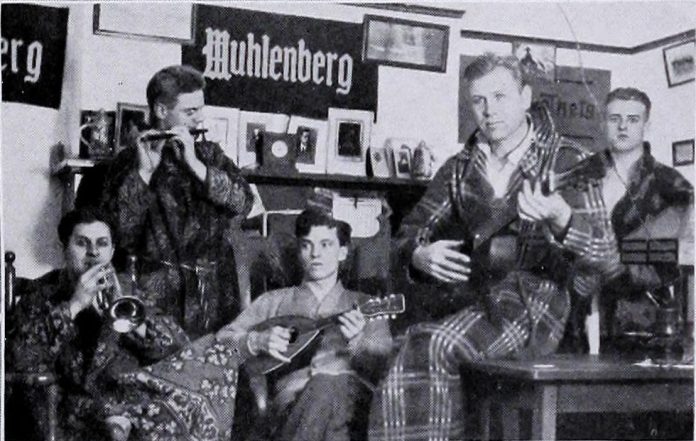The few of you who follow my stories closely likely know that I am lucky enough to have worked in the Special Collections department of the Trexler Library for a majority of my time at Muhlenberg. This, sadly, is an experience only a select few (usually only one or two per year) experience. However, it has given me the tools to fall in love with Muhlenberg College.
I have written at length about different aspects of Muhlenberg’s history, from its advent up to recent building renovations and guest speakers. I sometimes spend hours pouring through the digitized Weeklys or other records trying to find relatable and timely content. But through my research, I have gone on countless tangents and read articles not directly pertinent to my own, but still offering me insight into Muhlenberg’s past; and in doing so, my own. If you are reading this you are likely a Muhlenberg student, and are therefore a part of over a century and a half of men and women who came before you. I didn’t really appreciate this idea until my time as a Muhlenberg student was ending and my time as an alumnus was on the horizon.
The ability to connect with alumni old and new; whether through stories of Haps Benfer and Oscar Bernheim or lamenting over East’s uneven floors with people that graduated just a few years ago, is the gift that Muhlenberg’s intimate environment offers.
This invisible and seemingly intangible connection to each other is why Muhlenberg history should be so important to all of us. When I talk about Muhlenberg history, I certainly do not mean its more tedious history of its founding, other concrete facts, or even famous alumni, but instead I talk about the stories of Muhlenberg students’ past. Their stories from their time at Muhlenberg, no matter how inconsequential and average, are what I value most when approaching an article or my job. The ability to connect with alumni old and new; whether through stories of Haps Benfer and Oscar Bernheim or lamenting over East’s uneven floors with people that graduated just a few years ago, is the gift that Muhlenberg’s intimate environment offers.
This personal history is why you should concern yourself with Muhlenberg’s past, both the good and the bad. Though you might not believe so, Muhlenberg has constantly been growing and ever improving towards its goal of a “greater Muhlenberg” as mentioned in the recent Master Plan unveiled by President Williams. The bumps along the way, whether the rough transition to coeducation, certain firings of faculty, even to the unease involving protests and student voices while I’ve been here, are equally as important to the great improvements the college has made. Looking back and seeing a Muhlenberg I wouldn’t love gives me all the more reason to love the current day’s. Even if you don’t mirror my feelings and dislike this institution on its fundamental principles or its day-to-day functions, you are still a part of Muhlenberg counter-culture that has persisted throughout its years. Muhlenberg has seen students protesting coeducation, rallying for the removal of Muhlenberg’s past presidents and even recent opposition to the increased rate of tuition. This shows that even if you don’t love Muhlenberg’s history, you are still a part of it.
I know my sentiments here will not be shared by all, or even any, but I invite anyone reading this to think about who built their experience at Muhlenberg. Who founded your clubs or fraternities, who paved the way for you to be here, who has sat in your same classrooms even 100 years ago? Their experience at Muhlenberg would be far different from yours, but it will be much more similar than you’d imagine. Students still hung out in dorms like East and lied to themselves that they’d study, they still went to Seegers (or depending how far back — Walson) to eat lunch with friends and they still went to class in the identical building and learned nearly identical things.
So why does Muhlenberg’s history matter? Because it is your story, it is my story, and it is the stories of all the men and women that came before us, either one year or one hundred years ago.
Karl Schultz is a Senior with a History major, German minor, and a certification in secondary education. He began writing for the Weekly his freshman year after his roommate, now Editor-in-Chief, forced him to. He mainly writes about Muhlenberg College's forgotten past through his "This Week in Muhlenberg History" segment.























Love this, Karl! Thank you!
Love an article on Bernheim house. It was revolutionary because a group of juniors were selected to live there without a housemother. This was only about 5 years after becoming co-ed.
Elaine Griffith Ajello
Not Walson…….Old Commons, or perhaps, so far back, Commons. And it was the home of the Psychology and Philosophy Departments